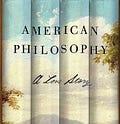Something is happening in philosophy, something unexpected, unpredictable, and uncontained. “Starting around 2010,” writes Crispin Sartwell in the LA Review of Books, “there was a striking change, surprising to someone trained in the 1980s”:
Some philosophy professors began to write a lot more personally; they tried to show how philosophical ideas had af…
Keep reading with a 7-day free trial
Subscribe to Under the Net to keep reading this post and get 7 days of free access to the full post archives.


